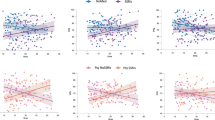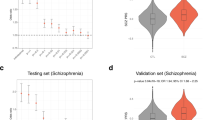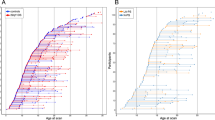Abstract
Although schizophrenia is strongly hereditary, there are limited data regarding biological risk factors and pathophysiological processes. In this longitudinal study of adolescents with 22q11.2 deletion syndrome, we identified the catechol-O-methyltransferase low-activity allele (COMTL) as a risk factor for decline in prefrontal cortical volume and cognition, as well as for the consequent development of psychotic symptoms during adolescence. The 22q11.2 deletion syndrome is a promising model for identifying biomarkers related to the development of schizophrenia.


Similar content being viewed by others
References
Sullivan, P.F., Kendler, K.S. & Neale, M.C. Arch. Gen. Psychiatry 60, 1187–1192 (2003).
Weinberger, D.R. Lancet 346, 552–557 (1995).
Murphy, K.C., Jones, L.A. & Owen, M.J. Arch. Gen. Psychiatry 56, 940–945 (1999).
Karayiorgou, M. et al. Proc. Natl. Acad. Sci. USA 92, 7612–7616 (1995).
Pulver, A.E. et al. J. Nerv. Ment. Dis. 182, 476–478 (1994).
Maynard, T.M. et al. Proc. Natl. Acad. Sci. USA 100, 14433–14438 (2003).
Shifman, S. et al. Am. J. Hum. Genet. 71, 1296–1302 (2002).
Liu, H. et al. Proc. Natl. Acad. Sci. USA 99, 3717–3722 (2002).
Chen, J. et al. Am. J. Hum. Genet. 75, 807–821 (2004).
Bearden, C.E. et al. Am. J. Psychiatry 161, 1700–1702 (2004).
Mattay, V.S. et al. Proc. Natl. Acad. Sci. USA 100, 6186–6191 (2003).
Seamans, J.K. & Yang, C.R. Prog. Neurobiol. 74, 1–57 (2004).
Blasi, G. et al. J. Neurosci. 25, 5038–5045 (2005).
Gogos, J.A. et al. Proc. Natl. Acad. Sci. USA 95, 9991–9996 (1998).
Fuller, R. et al. Am. J. Psychiatry 159, 1183–1189 (2002).
Acknowledgements
We thank L. Xiaoyan and J.F. Hallmayer for DNA extraction, and J. Keller for cognitive assessments. This work was supported by US National Institutes of Health grants MH50047, HD31715 and MH19908 (A.L.R.) and by the Swiss National Science Foundation, the European Union Federal Office of Education and the 'Child Care' Foundation (S.E.A.).
Author information
Authors and Affiliations
Corresponding author
Ethics declarations
Competing interests
The authors declare no competing financial interests.
Supplementary information
Supplementary Table 1
Characteristics of Study Sample. (PDF 37 kb)
Supplementary Table 2
The effect of COMT and PRODH genotypes on longitudinal change in BPRS, VIQ, CELFE scores and PFC volumes, of subjects with 22q11.2DS (PDF 55 kb)
Rights and permissions
About this article
Cite this article
Gothelf, D., Eliez, S., Thompson, T. et al. COMT genotype predicts longitudinal cognitive decline and psychosis in 22q11.2 deletion syndrome. Nat Neurosci 8, 1500–1502 (2005). https://doi.org/10.1038/nn1572
Received:
Accepted:
Published:
Issue Date:
DOI: https://doi.org/10.1038/nn1572
- Springer Nature America, Inc.
This article is cited by
-
An In Vitro Study for the Role of Schizophrenia-Related Potential miRNAs in the Regulation of COMT Gene
Molecular Neurobiology (2024)
-
Computational identification of variables in neonatal vocalizations predictive for postpubertal social behaviors in a mouse model of 16p11.2 deletion
Molecular Psychiatry (2021)
-
Assessing auditory processing endophenotypes associated with Schizophrenia in individuals with 22q11.2 deletion syndrome
Translational Psychiatry (2020)
-
Effectiveness and side effects of psychopharmacotherapy in individuals with 22q11.2 deletion syndrome with comorbid psychiatric disorders: a systematic review
European Child & Adolescent Psychiatry (2020)
-
Complement Activation in 22q11.2 Deletion Syndrome
Journal of Clinical Immunology (2020)





